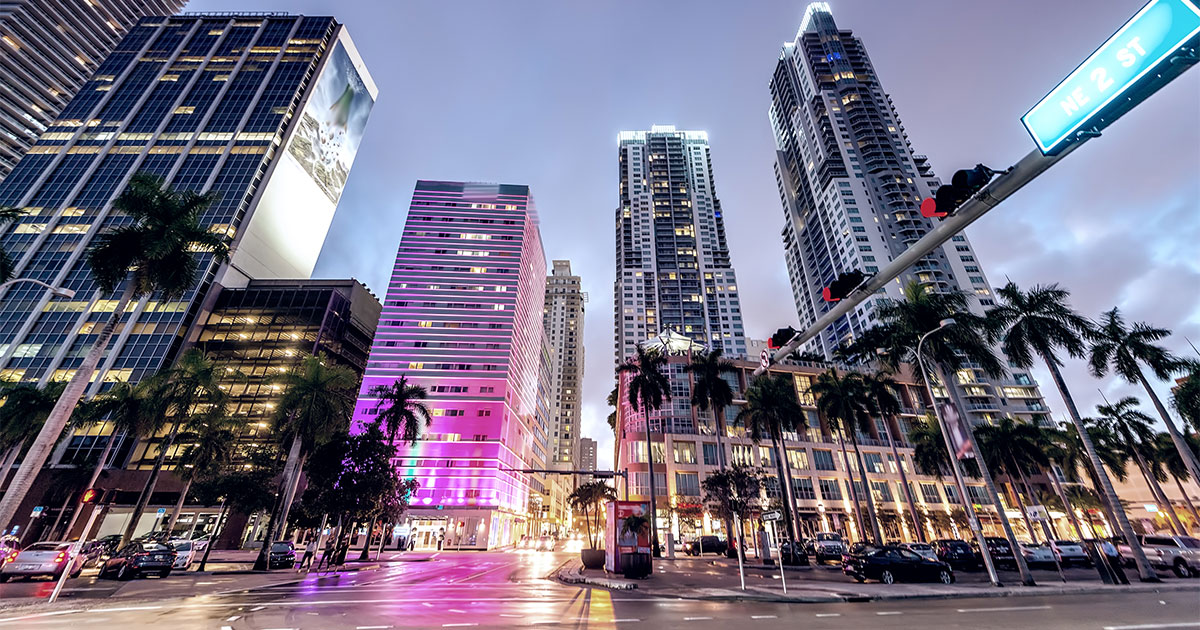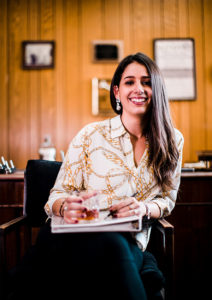Miami: Portrait of an Entrepreneurial City

Yes, the weather is amazing, and yes, she loves how peacocks roam around her neighborhood. But, a main reason that Danielle Zighelboim ’13 has settled in Miami and has no plans to leave is the many entrepreneurial-minded people she knows there.
Zighelboim moved to Miami just two days after her graduation from Babson College, as she and her brother were starting Coconut Cartel, a premium Latin rum brand. She soon found others launching ventures, many of them hanging out in co-working spaces and warehouses and trying to make their way in a place where landing a traditional job at a big company wasn’t necessarily possible.
“Miami was always just a party town. We didn’t really have an industry outside of hospitality. If you wanted to be here, you had to pave your own way,” Zighelboim says. “I always felt that Miami had so much opportunity for those who wanted to make it for themselves.”
That’s exactly what Zighelboim and her fellow entrepreneurs did. They grew their ventures while forming a community that continues to have each other’s backs.
“This is a small town. Somehow, we all still end up in the same rooms or connected by mutual friends,” she says. “I love this, because starting a business is really hard and lonely, and what has made it better has been working alongside peers who are living their dreams and building their companies. We give feedback to each other, we share resources, and we really do help each other with no strings attached.”
Deep Babson Ties
That can-do, we’re-in-this-together entrepreneurial spirit is a hallmark of Miami, a booming, sun-kissed city with deep ties to Babson. A large number of alumni make their home in the area, and the College’s popular Miami location offers a variety of educational programs, including a Blended Learning MBA.

In conversations and over emails, Babson alumni in Miami describe why the region is such a great place to start and grow a business. They mention the weather, of course, and the stunning surroundings. They also discuss the area’s burgeoning tech scene, its cultural amenities, its status as a gateway to Latin America, and its favorable tax policy. “It’s very pro-business,” says Ricardo Caporal ’00, president and founder of the Mattoni Group, a private equity real estate company. “You put more money in your pocket here as an entrepreneur.”
Most of all, they mention the city’s people, who are a diverse, energetic, and dedicated group. Zighelboim is happy to have so many of them in her life. “We started alongside so many other incredible entrepreneurs who now, years later, have built this city into the world city it is today,” she says. “Miami is just getting started, and I wouldn’t want to be anywhere else besides here, with the same crew.”
A Rich Diversity
Wake up in Miami, and the day can feel filled with possibility. “Every day, I open my window, and it is an amazing day,” says Diego Lowenstein ’89, P’21 ’22. “You wake up happy every day. The weather allows it.”
Lowenstein knows Miami well. His family’s business, Lionstone Development, was founded by his grandfather and has been doing business in South Florida since 1966, the year it bought its first hotel in Miami Beach.
Back then, Miami was a pleasant but sleepy tourist town, and through the years, Lowenstein has witnessed its struggles and triumphs. The 1980s were a particularly tough time. “Those were the Scarface days, the ‘Miami Vice’ days. There were drugs and shootings,” says Lowenstein, the CEO of Lionstone, the developer, owner, and manager of hospitality and residential properties. “It was an amazing destination that went sour. There wasn’t a lot of organic investment.”
“The immigrant community of Miami brings with it a sense of hustle that makes it ripe for entrepreneurial ventures.”
Sanket Parekh MBA’05, founder and managing partner of Secocha Ventures, an early-stage venture capital firm
Miami has evolved to be much more than just a city built on hospitality, Lowenstein says. It has everything one needs to launch and sustain a business: investors, talented workers, consultants. “The last 10 years, it has been even more of an evolution. If you went into a deep coma in the 1990s and woke up now, you wouldn’t understand what went on,” he says. “I think the ease of doing business in Miami is like nowhere else. It is a great place to locate a company.”
For Lowenstein, the biggest thing Miami has going for it is its diversity. The city attracts people not only from Latin America but also from across the United States, Europe, and the world. Differences among all those many people are respected and celebrated. “That is a fabulous thing,” he says. “It is a community with a tremendous tolerance for diversity. People are respected here.”
A City of Newcomers
Miami’s diversity can be a powerful draw. Mariana Yepes MBA’20 had been living in Orlando, Florida, when she moved to Miami while an undergraduate. She was seeking a place with a rich cultural diversity. “It creates a very energetic and eclectic ambiance in the city,” says Yepes, who owns a commercial and residential HVAC company with her brother.
That vibrant atmosphere makes it a fitting setting in which to start a business, says Sanket Parekh MBA’05. He is the founder and managing partner of Secocha Ventures, an early-stage venture capital firm. “The immigrant community of Miami brings with it a sense of hustle that makes it ripe for entrepreneurial ventures,” he says.
That community also brings with it a deep pool of engaged workers. “Miami is a great place to run and grow a business because the workforce here is unique,” Yepes says. “You will always find good people, often immigrants who came to the U.S. in search of a better future for themselves and their families, so they’re willing to work extra hard and go the extra mile.”
“We started alongside so many other incredible entrepreneurs who now, years later, have built this city into the world city it is today. Miami is just getting started, and I wouldn’t want to be anywhere else besides here, with the same crew.”
Danielle Zighelboim ’13, co-founder of Coconut Cartel
To live and work in Miami is to experience a city defined by newness, with a continual wave of new ventures, new construction, and new people. “This cycle of newcomers, who then become the ones who welcome the next set of newcomers, is what keeps the city going,” Parekh says.
Sam Garzon MBA’13 is one of those newcomers. The founder of Unozero, which sells soccer cleats and accessories, moved from Boston to Miami three years ago. Lots of soccer is played in Miami, and the city’s diversity is mirrored in the sport’s players. “We are a soccer-centric brand,” Garzon says, “and Miami offers an unrivaled pool of soccer players from all levels, ages, and nationalities.”
In Miami, he found a city that has the energy and drive to match that of his growing company. It’s a fitting home. “Miami is a young, vibrant, and growing city,” he says, “all aspects relevant to a young sports brand like Unozero.”
Posted in Entrepreneurial Leadership




